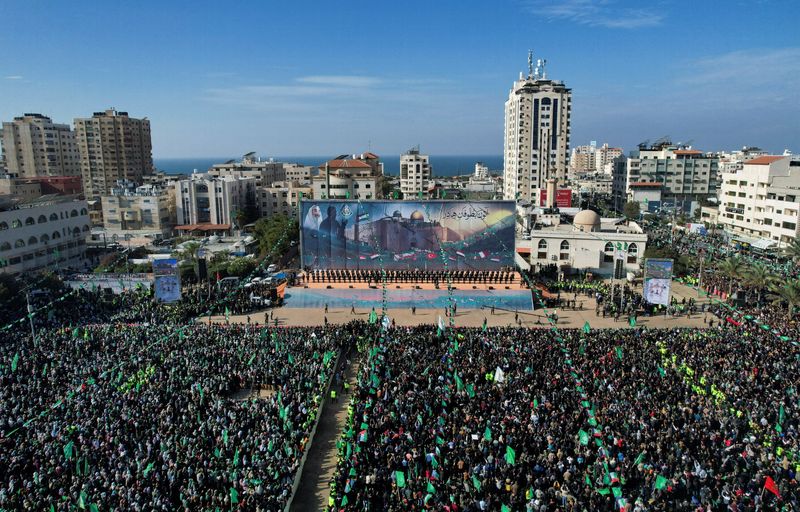Who is Kevin Hassett? Wolfe looks at the Trump ally tipped to become Fed Chair.
By Nidal al-Mughrabi
GAZA (Reuters) - Gaza's ruling Hamas Islamists are building ties with militant groups in the West Bank, seeking to attract support beyond the enclave by backing Palestinians involved in near daily unrest that Israel's new hardline government has vowed to crush.
The initiative reflects a degree of caution on the part of Hamas, which is still rebuilding the enclave following a 2021 war and appears unwilling to pursue a head on confrontation from Gaza with the administration of Prime Minister Benjamin Netanyahu, analysts said.
The return of Netanyahu in an alliance with a clutch of religious and hard right parties avowedly in favour of settlement expansion has drawn fears of renewed confrontation with the Palestinians and in particular with Hamas, which has fought five wars with Israel since 2009.
New hardline ministers like Itamar Ben-Gvir, a settler from Hebron, will be in charge of police as national security minister, while Bezalel Smotrich, another far-right politician, will have wide control over policy in the West Bank.
But for Hamas, still rebuilding in Gaza after a costly 10-day war more than 18 months ago, the main battleground is likely to be in the towns and refugee camps of the West Bank, where its rival Fatah has faced increasing challenges from younger militant groups.
"We see that the prime mission that we are doing is to reinforce resistance in the West Bank and support it with what it needs to pursue its work and develop it," said Zakaria Abu Maamar, a member of Hamas's political office.
"The more we make things harder on the occupation, the more we confront it and hurt it, the more we can foil its policies."
Last year saw some of the worst violence in over a decade in the West Bank as the army conducted a near-daily series of raids in cities like Nablus and Jenin following a spate of deadly attacks by Palestinians in Israel.
More than 160 Palestinians were killed as Israeli forces stepped up their operations and young fighters, disillusioned with old-style Palestinian movements like Fatah, formed new groups like the "Den of Lions" in Nablus.
RESISTANCE HARDENS
Footage of teenaged gunmen in combat gear firing into the air at funerals or brandishing their weapons at impromptu rallies became a familiar sight last year as resistance to the Israeli crackdown hardened.
Rivalry between a myriad of armed militant groups has long hampered Palestinian hopes of taking on Israel's powerful army but there have been increasing efforts to overcome or at least paper over the differences.
"Fatah sons, Hamas sons, sons of the Islamic Jihad and the Popular Front are working together within unprecedented resistance formations," Maamar said.
"Den of Lions, Jenin Brigades, formations where people from all Palestinian factions are working together," he said.
Behind such declarations is the reality that the moment is not ideal for Hamas, which analysts say is busy wrestling with tough economic challenges in Gaza, an overcrowded coastal enclave cut off by both Israel and Egypt where unemployment runs at more than 50%.
Under Israeli policies designed to create economic security incentives, 20,000 Gazans are allowed to cross into Israel for work. "These people will not forgive Hamas if they lose their jobs," said Gaza analyst Talal Okal.
"Hamas's theory, I believe, is to relatively maintain calm in Gaza in return for (economic) improvements while escalating resistance against Israel's occupation in the West Bank," he said, referring to possible improved access to jobs in Israel and an easing up of the economic blockade.
With Fatah leader and Palestinian Authority President Mahmoud Abbas now well into his 80s, Hamas also has an eye on the future in the West Bank, where it has been largely excluded from a formal political role.
Born out of the Muslim Brotherhood movement in the late 1980s, Hamas assumed power in Gaza after defeating Fatah in elections in 2006.
ARMED CELLS
However it stayed out of a brief conflict last year when Israeli planes bombarded Gaza over an August weekend, hitting the smaller Islamic Jihad group but avoiding strikes on Hamas.
"We don't deny that we work according to a vision and calculations that take into consideration the interests of our people and the interest of the resistance and that doesn't shame us," Maamar said.
For its part, Palestinian Authority officials say Hamas is funding some armed cells in the West Bank, in part to weaken the PA, and Israeli officials say they are also closely watching Hamas' moves in the West Bank.
Ram Ben-Barak, an opposition lawmaker, who last year ran the Israeli parliament's Foreign Affairs and Defence Committee, said Hamas's end goal was to seize control of the West Bank and wage conflict from there and Gaza against Israel.
Israel should "weaken the Hamas militarily as much as possible" while helping to improve conditions for Palestinians in both Gaza and the West Bank to reduce the potential for conflict, Ben-Barak said.
Miscalculation or provocation from either side could end the fragile calm, risking Israeli-Palestinian friction at flashpoint sites such as the Al Aqsa mosque complex in Jerusalem, a site holy to both Muslims and Jews who know it as the Temple Mount.
"If we face a duty we must do and if we saw that the interest of our people requires us to act, we will not hesitate," Abu Maamar said.
